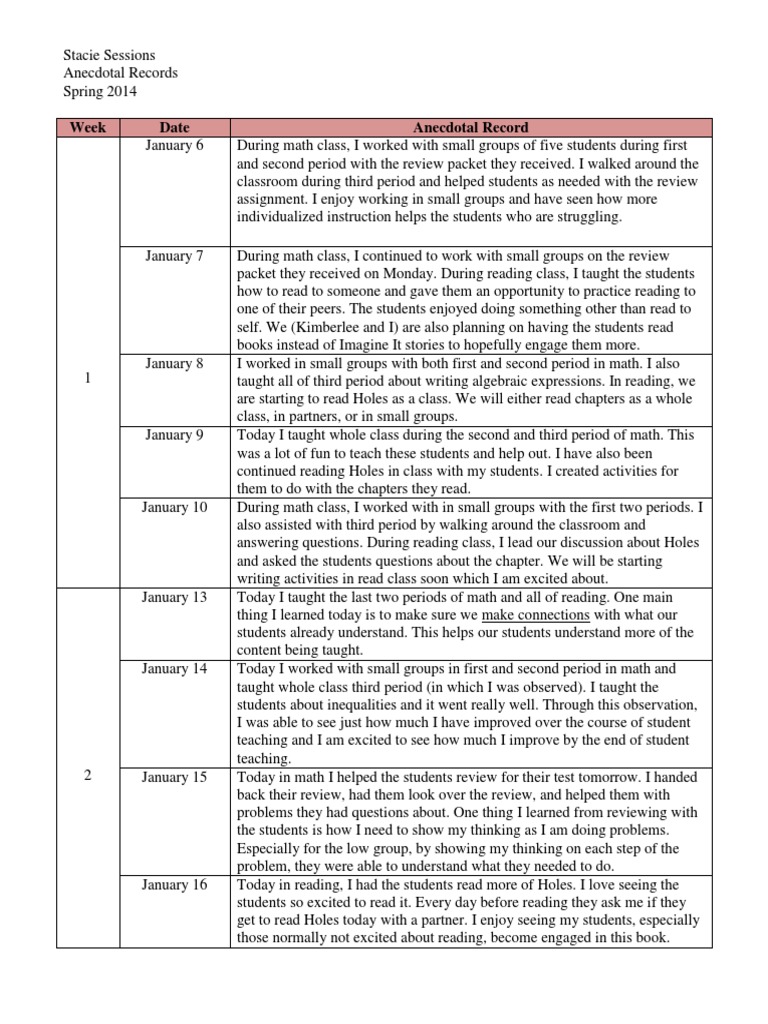Imagine a classroom bustling with young minds: each student, a unique constellation of strengths, challenges, and experiences. How can educators truly understand the intricate journeys of their students? How can they capture those moments of brilliance, those flashes of struggle, and those heartwarming triumphs that shape their academic and personal growth? This is where the magic of anecdotal records comes in.

Image: www.scribd.com
Anecdotal records, more than just scribbled notes, are a teacher’s window into the vibrant tapestry of their students’ lives. They are the raw, authentic stories that illuminate the learning process, providing a rich repository of insights and reflections. In this guide, we’ll delve into the world of anecdotal records, exploring their purpose, their power, and practical tips for creating impactful records that empower both educators and students.
Unveiling the Essence of Anecdotal Records
At their core, anecdotal records are concise, descriptive narratives that document specific observations of student behavior, learning, and interactions. They are not mere checklists or assessments, but rather, they are snapshots of student growth in action. Think of them as mini-stories that capture the nuances of a student’s learning journey, providing a deeper understanding beyond simple test scores or grades.
The Power of Story: Why Anecdotal Records Matter
The beauty of anecdotal records lies in their ability to humanize the learning process. They move beyond the cold statistics of grades and tests, revealing the authentic voice and experiences of each student. Let’s explore some key benefits of embracing anecdotal records:
- Personalized Learning: Anecdotal records are a powerful tool for tailoring instruction to individual needs. By observing specific strengths and challenges, teachers can create personalized learning plans that cater to each student’s unique learning style and pace.
- Uncovering Hidden Talents: Sometimes, a student’s true potential lies beyond the confines of traditional assessments. Through anecdotal records, teachers can capture those moments of spontaneous creativity, insightful problem-solving, or compassionate leadership—qualities that might otherwise go unnoticed.
- Building Stronger Student-Teacher Relationships: Anecdotal records go beyond simple observations. They reflect a genuine investment in each student’s growth. By sharing insights with students, teachers create a supportive and collaborative learning environment where students feel understood, valued, and empowered.
- Documenting Growth and Progress: Anecdotal records provide a rich narrative of a student’s academic and personal development. They create a tangible timeline of achievements, challenges, and adjustments, offering valuable evidence for student portfolios, progress reports, and parent-teacher conferences.
- Empowering Students: Anecdotal records are not just for teachers. By sharing these observations with students, teachers can spark self-reflection and encourage goal setting.
Crafting Compelling Anecdotal Records: A Teacher’s Toolkit
Now that we understand the powerful benefits, let’s explore practical strategies for creating impactful anecdotal records.
- Specificity is Key: Avoid vague or general observations. Instead, focus on specific details, actions, and behaviors. For example, instead of stating “John is a good listener,” write, “John actively listened to his classmates’ ideas during the group project, offering supportive feedback and building on their suggestions.”
- Capture the “Why”: Don’t just record what you see, but explore the “why” behind the observation. What caused this behavior or reaction? For instance, “Sarah completed her math assignment with exceptional speed and accuracy, demonstrating her strong grasp of the multiplication concept.”
- Observe Across Different Settings: Record observations from various classroom contexts – during group projects, individual work, presentations, or even casual conversations. This provides a holistic picture of the student’s learning and social-emotional development.
- Embrace the Positive and the Challenging: Anecdotal records are not just about highlighting successes. By documenting challenges and areas for growth, teachers can create action plans and provide focused support where needed.
- Seek Student Input: Whenever possible, involve students in reflecting on their own progress. Ask them questions like, “What were you most proud of today?” or “What are some things you’d like to improve?”
- Use a Consistent Format: To organize your observations, consider using templates or a standardized format for your anecdotal records. This ensures consistency and allows for easier referencing and analysis.

Image: www.pinterest.com
From Observations to Action: Leveraging Anecdotal Records
Anecdotal records are not meant to be static documents. They are tools for continuous improvement and personalized learning. Here’s how to use these powerful insights to benefit your students:
- Inform Instruction: Use anecdotal records to adjust your teaching strategies, differentiate instruction, and provide targeted support to meet individual needs.
- Foster Communication: Share meaningful observations with students and parents, encouraging open dialogues about learning goals, progress, and areas for growth.
- Celebrate Success: Use anecdotal records to highlight students’ strengths, achievements, and personal growth.
Sample Of Anecdotal Records Of Students
In Conclusion: Empowering Students with the Power of Story
Anecdotal records are a powerful tool for educators and a valuable resource for students. They humanize the learning process, fostering personalized growth, building strong relationships, and illuminating the unique journey of each student. Through insightful observation, thoughtful documentation, and a commitment to personalized learning, teachers can create a supportive and inspiring learning environment where every student thrives.






